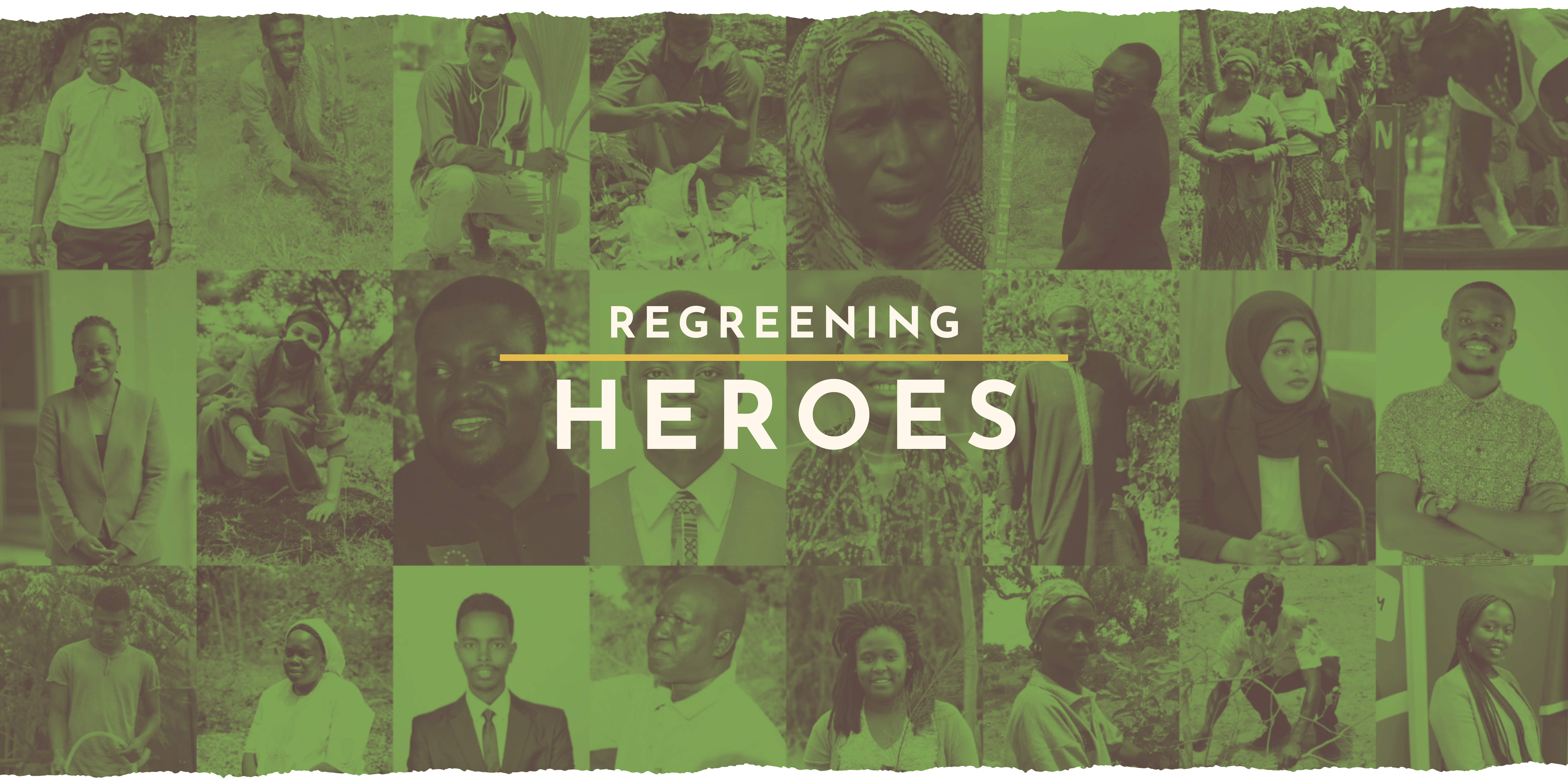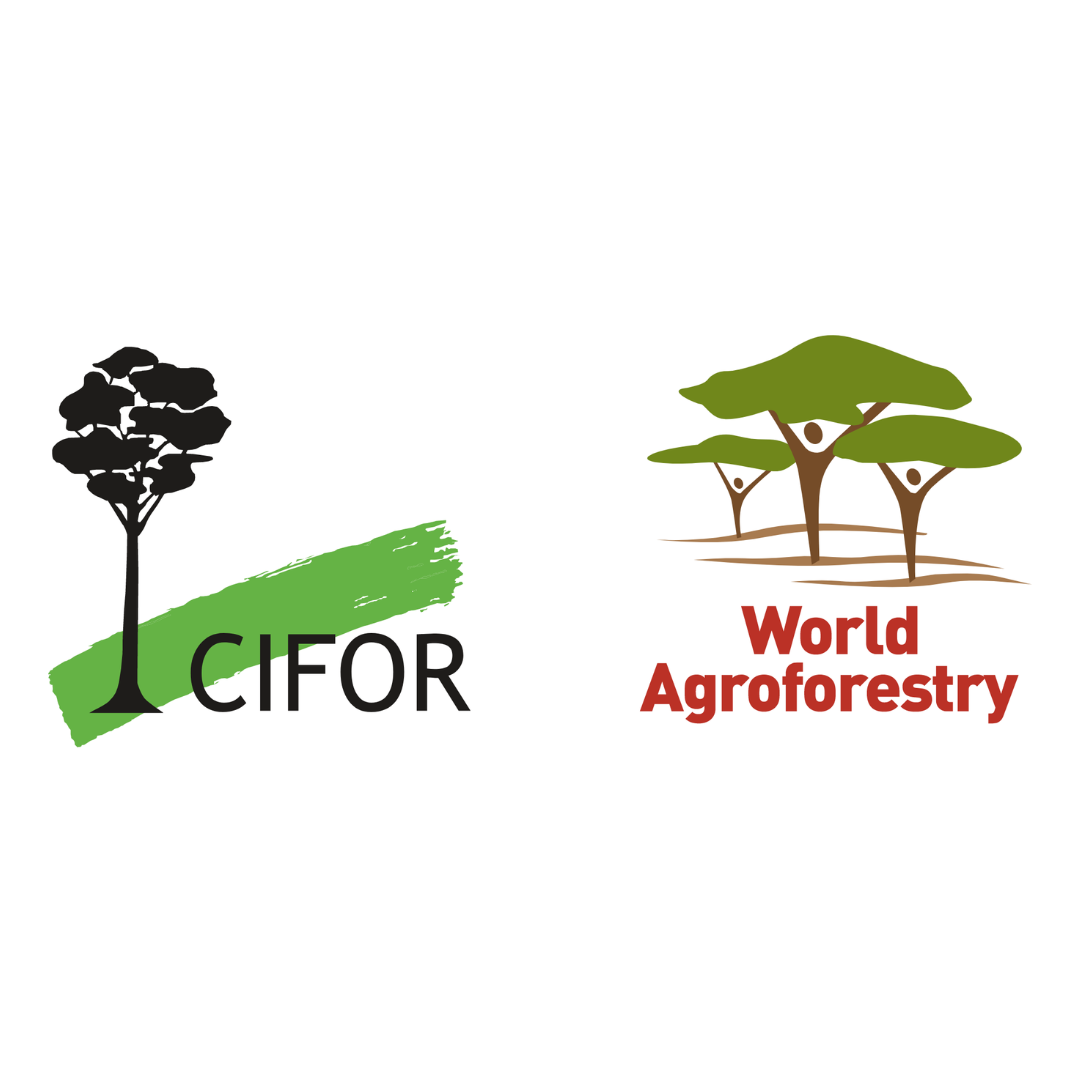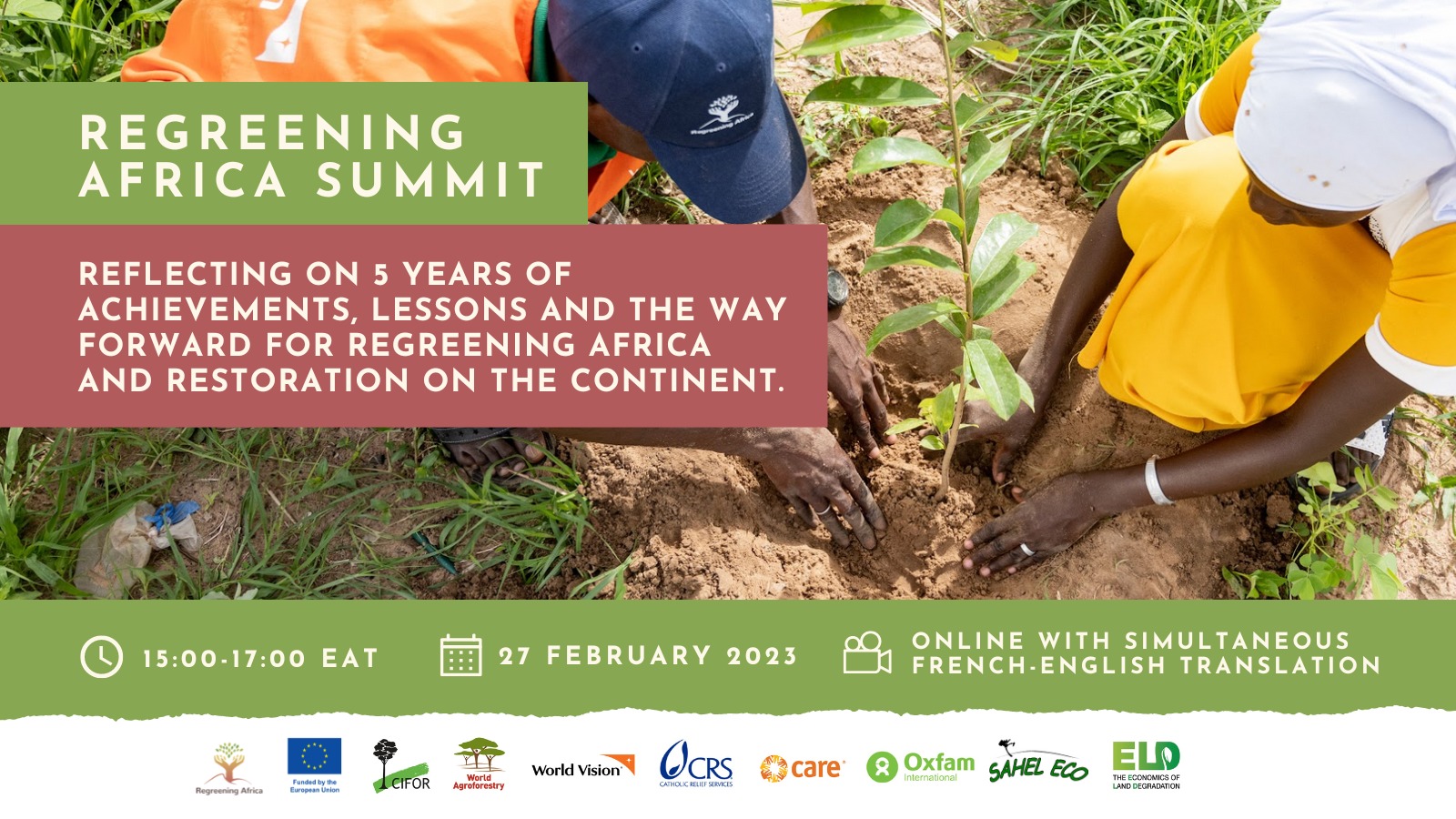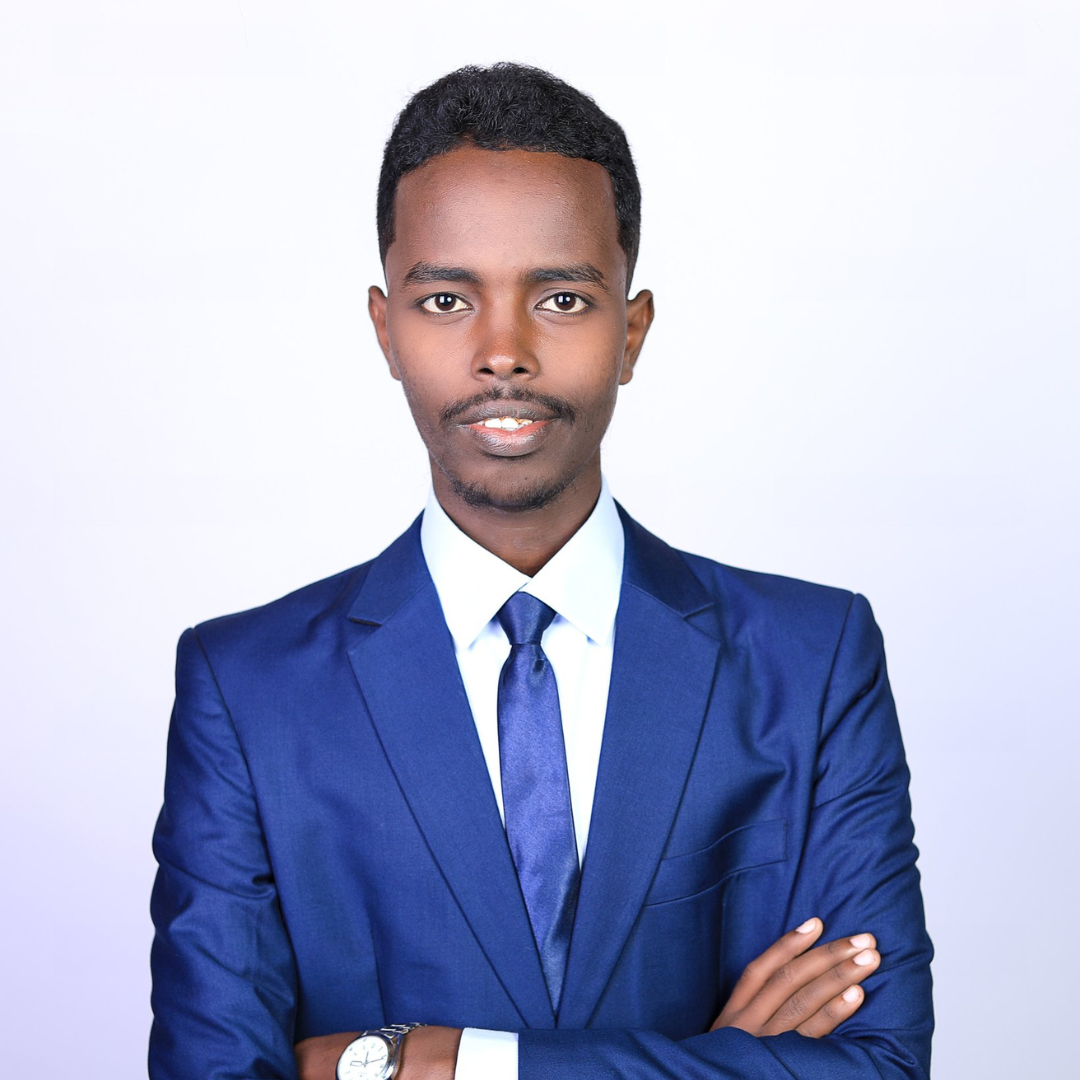
Honouring those who use their knowledge, resources, and passion to restore our landscapes and improve lives in communities across Sub-Saharan Africa.
The landscape restoration movement in Sub-Saharan Africa is rapidly gaining momentum. This region of the world has been severely impacted by deforestation, poor land management practices, and the effects of climate change, leading to a dramatic decrease in the overall quality of the environment. In response, a number of initiatives have been launched over the years to address these issues and promote sustainable conservation efforts.
Some of the most prominent of these initiatives are the African Forest Landscape Restoration Initiative (AFR100) which is committed to bringing 100 million hectares of land in Africa back into restoration by 2030, and the Great Green Wall which is increasing the amount of arable land in the Sahel region. And then, of course, there’s the Regreening Africa ambitious research-in-development project which aims to reverse land degradation on 1 million hectares across 8 countries in Sub-Saharan Africa, improving the resilience of 500,000 households in the process. These initiatives, and many others like them, also respond directly to bigger global development initiatives such as the African Union Agenda 2063 and the United Nations Sustainable Development Goals to end the epidemics of poverty, hunger, and environmental degradation.
At the forefront of the restoration efforts in the region are the individuals and organisations dedicated to restoring Africa’s environment and supporting people. Conservationists, researchers, governments, and environmental NGOs, as well as community members and faith institutions, play a critical role in the fight against environmental degradation and poverty. From developing innovative approaches to sustainable land management to advocating for better policies and practices, these people use their collective knowledge, resources, and passion to make a real difference in the lives of millions of people across Africa and they deserve to be honoured and celebrated.
To this end, the Regreening Africa team has put together this showcase piece, spotlighting our partners as well as independent restoration advocates who have inspired us as we convened our 5-year land restoration project in Ethiopia, Ghana, Kenya, Mali, Niger, Rwanda, Senegal and Somalia. We invite you to join us in celebrating our Regreening Heroes and to pay the respect forward by highlighting more heroes in your community.
Regreening Africa and Partners
Regreening Africa is a five-year research-in-development project funded by the European Union. This ambitious project seeks to restore 1 million hectares of land and benefit 500,000 households across eight countries, including those covered by the Great Green Wall such as Ethiopia, Mali, Niger, and Senegal.
To reach its goal, Regreening Africa has partnered with a number of iNGOs who lead the project’s in-country implementation efforts. These implementation partners leverage their vast networks and experience to accelerate the scaling of regreening practices across the eight countries.

World Agroforestry CIFOR-ICRAF
World Agroforestry (CIFOR-ICRAF) is a centre of science and development excellence that harnesses the benefits of trees for people and the environment. Leveraging the world’s largest repository of agroforestry science and information, CIFOR-ICRAF develops knowledge practices, from farmers’ fields to the global sphere, to ensure food security and environmental sustainability. As part of its vision for an equitable world where all people have viable livelihoods supported by healthy and productive landscapes, CIFOR-ICRAF led the establishment of the Regreening Africa project in 2017.

World Vision
As a Christian, child-focused, community-empowering global partnership, World Vision defines impact as “changes that we contribute to in the well-being of children – especially the most vulnerable – and their communities”. Because its end goal is the well-being of children, the organisation focuses its landscape restoration support on programmes that empower households economically. As a result, over the last 5 years, World Vision and Regreening Africa have partnered on several activities under the priority areas of income generation, sustainability, and faith-inspired approaches in Ethiopia, Ghana, Kenya, Niger, Rwanda, Somalia, and Senegal.

Catholic Relief Services (CRS)
Catholic Relief Services was founded in 1943 by the Catholic Bishops of the United States to serve World War II survivors in Europe. Since then, the organisation has expanded in size to reach more than 130 million people in more than 100 countries on five continents. For over 75 years, their mission has been to assist impoverished and disadvantaged people overseas, working in the spirit of Catholic social teaching to promote the sacredness of human life and the dignity of the human person. As part of this mandate, CRS partnered with Regreening Africa and has supported us in various meaningful agroforestry practices, including Farmer Managed Natural Regeneration (FMNR) and tree growing in countries such as Ethiopia and Ghana.

CARE
CARE International is a 75-year-old global confederation working to fight poverty and social injustice in the world, with a specific focus on the empowerment of women and girls. The organisation works side-by-side with communities to understand the root causes of poverty and find innovative, locally-led solutions. In partnership with Regreening Africa, CARE has deployed support to countries such as Niger and Somalia, empowering the most vulnerable smallholder farmers and pastoralists as they practice agroforestry techniques for the improvement of their production and Assisted Natural Regeneration (ANR).

OXFAM
Oxfam is a global movement of people, working together to end the injustice of poverty. They tackle the inequality that keeps people poor and help people build better lives for themselves and for others. Together with Regreening Africa, OXFAM has done extraordinary work in Mali, leading a consortium of partners to expand the scale of FMNR and other agroforestry practices suited to the Sahel Region. In this partnership, special attention has also been paid to best practices including addressing issues of land rights, climate change, and gender inclusion.

Sahel Eco
Mali-based NGO Sahel Eco promotes inclusive socio-economic development that respects the environment and meets the needs of present and future generations in the Sahel. They are aware of the many challenges that our communities experience in the face of climate change, such as resilience, sustainably managing natural resources, as well as diversifying the rural economy. They also understand the disappearance of certain forests, the threat to the biodiversity of local tree species, the persistence of bushfires, and land degradation. Through their work, Sahel Eco aims to provide solutions to all these questions. As a Regreening Africa implementation partner, this organisation has been instrumental in the efforts to strengthen the value chains of valuable tree species, such as Shea (Vitellaria paradoxa) and Nere (Parkia biglobosa) in Mali.

The Economics of Land Degradation (ELD)
Hosted by the German Cooperation and the Deutsche Gesellschaft für Internationale Zusammenarbeit, the Economics of Land Degradation is a global science-policy initiative that works to integrate the economic value of land and its ecosystem services in decision-making and to capitalise on this value through policy reforms, economic instruments, institutional design and financing strategies. In the Regreening Africa project, the ELD team has strengthened the capacities of national governments and other partners to assess the costs of land degradation and the economic benefits of investments in sustainable land management. ELD shows that sustainable land management pays off.

Global Evergreening Alliance
The Global EverGreening Alliance works with its numerous member organisations, governments and multi-lateral agencies to implement massive land restoration programmes across the globe. The Alliance fosters collaboration, learning sharing and harmonisation across institutions, sectors and borders. As part of this mandate, the Alliance leveraged the opportunity to collaborate with Regreening Africa and convened a project named ‘Reversing Land Degradation in Africa through Scaling-up Evergreen Agriculture’. The project was implemented in Burkina Faso, Ethiopia, Ghana, Kenya, Mali, Niger, Rwanda, Senegal, and Somalia (Somaliland and Puntland).
Regreening Africa Heroes: Women
Women comprise, on average, 43% of farm labour in the Global South. Despite being key players in both agricultural and pastoral production processes though, female farmers face significant barriers to realising the benefits of their labour. Regreening Africa supports gender-equitable policies and practices that empower women and girls by promoting economic and social rights that strengthen their voices and participation. With this showcase, we also celebrate some of the powerful women who are actively making a difference in our communities through the #GenerationRestoration movement.
Filsan Ahmed, Ethiopia (Twitter)
In July 2019, the nation of Ethiopia was reported to have planted 350 million tree seedlings in one day. This achievement was only a part of its ambitious goal to plant 5 billion trees across 1.5 million hectares in 3 months under the national #GreenLegacy Initiative. Ethiopian Minister for Women, Children and Youth at the time, faced up to the challenge in a remarkable way that moved many restoration advocates online and on the ground. She not only contributed to the initiative through her own tree-planting efforts but also encouraged others to join her and commemorate the event as an effort to strengthen social protection for children and the earth. Presently, Filsan continues to contribute to Ethiopia’s #GreenLegacy, planting the seeds for a brighter and greener future in schools and nurseries across the country.

Gifty Hodey Manye, Ghana (Twitter)
Gifty is a trained Communications expert, Philanthropist, and Agriprenuer who focuses on bridging the gap between the farmer and the beneficiaries of the agricultural industries in Africa and beyond. She is also the Founder and CEO of the BizTrends Show and has interviewed a roster of experts in the agricultural industry on topics related to entrepreneurship and agribusiness development and how these impact the local Ghanaian economy. Presently, Gifty is producing and hosting her second critically acclaimed TV Show called The Ghanaian Farmer. She firmly believes that “the agricultural and agribusiness industry are the catalysts for building community, driving inclusive economic growth and advancing change in Africa“

Patricia Mumbua Kombo, Kenya (Twitter)
Patricia is a passionate Environmentalist, United Nations Convention to Combat Desertification (UNCCD) Land Hero, and Founder of the PaTree Initiative. She advocates for sustainable land use that is rooted in indigenous knowledge and practices and aims to end hunger and malnutrition in rural communities. Through her PaTree initiative, Patricia has visited 15 schools, established environmental clubs, worked with pupils to set up kitchen gardens, and restored degraded landscapes by planting over 50,000 trees. Her ultimate goal is to give a voice to young generations and women and train them to act for climate through tree growing, organic farming, and forest conservation.

Assumau Djibou, Niger
Assumau is part of the Regreening Africa community in Oulallam District, Niger. She is a member of the Women’s Cooperative, a group of women farmers who take care of tree nurseries and generate income from selling seedlings. Assumau says she plants trees to prevent the wind from destroying their lands and cultures. “A field without trees does not produce well, but if our planted trees endure over the coming years, we will have won the game!”

Florence Sifa Sangwa, Rwanda (Twitter)
Florence is a young and proud Agripreneur from Rwanda. She is currently pursuing a Bachelor of Science in Conservation Agriculture at the Rwanda Institute for Conservation Agriculture. With a notable social media presence, Florence is also an agri-influencer who uses her page creatively to share agricultural insights, show the value of farming for youth in Africa, and create fun engagements with her vibrant community of fellow farmers and regenerative agriculture advocates. In her own words, Florence says “Being a farmer has been one of the best decisions I’ve ever made.”

Mariama Sonko, Senegal
In her 2021 profile by The Guardian, Mariama was described as “the activist working to revolutionise west African farming”. She heads Nous Sommes la Solution (NSS, We are the Solution), an ecofeminist movement of more than 500 rural women’s associations in Burkina Faso, Ghana, Guinea, Guinea-Bissau, Mali, Senegal, and the Gambia. The movement fights large-scale industrial farming and promotes sustainable farming methods which are often rooted in traditional practices. In Mariana’s own words, “It’s the indigenous knowledge and practices that have always supported food sovereignty, and this know-how is in the hands of the women. Ecofeminism for me is the respect for all that we have around us.”

Khadija Mohamed Al-Makhzoumi, Somalia (Twitter)
Khadija is the first Minister of Environment & Climate Change in the Federal Republic of Somalia. At the Horn of Africa, Somalia is currently hard hit by large-scale drought, food crisis, and is extremely vulnerable to the consequences of climate change. As much as 80% of the Somali territory suffers from drought and the UN has estimated that up to 90% of the country could become uninhabitable by 2030 due to climate change. As the first Minister in her position, Khadija has launched and plugged into a number of initiatives to tackle climate change, drought and land degradation in the country, including the #GreenerSomalia campaign which is a national Re-Greening initiative to plant 10 million trees by the end of 2023.

The Coprokazan Women’s Group, Mali (Facebook)
Women in Mali have been benefitting from the value chain of the shea tree for many years and are often at the forefront of the sustainable restoration efforts for this tree. The Coprokazan group, a women’s cooperative for the production of shea butter in Zantiébougou, was established in 2005. And now, having grown to over 1500 in size, they have made the shea butter from this region popular in Mali and far beyond. Beyond leveraging the value of the shea tree to generate income, the Coprokazan group has also led the charge in establishing a development plan for the organic shea sector in the region, and even extended the value chain to Mali’s health sector where they addressed issues of maternal, infant, and child mortality.


Five years after the Regreening Africa project began, it is time to look back and reflect.
Join us for the Regreening Africa Summit on Monday, 27 February 2023, as we unpack insights, lessons and achievements from the programme, as well as the way forward for Regreening Africa and restoration on the continent.
Register here.
Regreening Africa Heroes: youth
Underemployment and limited livelihood options for youth are prime drivers of instability, insecurity, and migration. Regreening Africa expressly focuses on increasing youth engagement in agroforestry through training, capacity development, and the support of key commodities. With this showcase, we also celebrate some of the young #RegreeningHeroes who are empowering themselves and others through the #GenerationRestoration movement.

Mamu Alemu, Ethiopia
Mamu was only 19 years old when the #GreenLegacy initiative kicked off in Ethiopia and this tree-planting blitz gave him an idea: to start a tree nursery on land next to his family’s home in Tefki. Luckily for him, an African Development Bank-funded water scheme in his town enabled him to kickstart his business and become an Agripreneur while his peers pursued other opportunities like car-washing businesses. Through his work, Mamu was able to cultivate seedlings which he sold to generate income. He planned to use the money to contribute to his own and his siblings’ school fees.

Hyginus Laari, Ghana (Twitter)
Hyginus, or Mr SDGs as he affectionately refers to himself, is the Communications Officer for the Global Landscapes Forum (GLF) youth team. He has led several high-impact land restoration campaigns, including Africa’s Drylands: A Restoration Road Trip, and the Young African Landscape Leadership Programme. Additionally, owing to his advocacy for the planet’s resilience through Sustainable Development Goals 6 and 13, Hyginus has received several national and international recognitions including being named the African finalist for the UNEP Young Champions of the Earth Prize in 2018, being named one of 100 Young African Landscape Leaders during GLF’s Restoring Africa’s Landscape campaign in 2018, and receiving the Millennium Excellence Foundation’s Youth Prize for Environmental Excellence.

Lamech Opiyo, Kenya (Twitter)
Lamech is an award-winning Environmental Conservation Champion, Climate Activist, Youth Leader, Rotaractor, and Changemaker from Kenya. For the past 4 years, Lamech has been advocating for landscape restoration in Africa through his (and our) favourite slogan #GenerationRestoration. Some of his most memorable highlights in this time include his contribution to environmental education and the planting and growing of 17,000 trees in 25 primary schools in Kenya. Lamech’s work in the landscape restoration space aims to encourage and nurture a conservation culture in young people, and to build resilience to climate change. He believes that action inspires hope and that we can create hope for our planet through action.

Adama Kante, Mali (Twitter)
Adama is a young farmer and vlogger from Bamako, Mali. His interest in farming was sparked when he was still a teenager and since then he has put in daily work to establish and maintain his business. After starting with only 20 m2 of rented land years ago, Adama now owns 7 hectares of farmland and grows tomatoes, lettuce, celery, and parsley which he sells at an affordable price through his 15 mobile kiosks across Bakamo. As an Agripreneur, Adama now employs over 30 people and dreams of growing his business even bigger so he can create more jobs and overcome food insecurity in a sustainable way.
“Africa’s demographic is going to boom by 2050 and this shows there is potential. We must prepare and set up means to provide food for all those people.” Adama Kante

Hamed Constantin Tchibozo, Niger
Hamed is our in-house Regreening Africa hero in Niger! He works as a Regreening Africa Project Coordinator at World Vision Niger. He is an Agricultural Engineer and expert in agricultural production and rural development. Hamed holds a deep passion for environmental conservation techniques that lead to climate resilience and socio-economic benefits for our recipient communities.

Alioune Badara Gueye, Senegal (Twitter)
Alioune is an Environmental Geographer by training, Coordinator of the GYBN Senegal Chapter (Senegal Youth Biodiversity Network), and Founder of the SenOxy Citizen Initiative which focuses on urban and school reforestation and the development of public green spaces. Alioune advocates for reforestation because he believes that plants are the most effective beings to reverse the curve of landscape degradation, especially in urban landscapes that are increasingly suffocated by buildings. Through his initiatives, he has carried out more than 50 days of reforestation and awareness-raising throughout Senegal, planting more than 15,000 plants in neighbourhoods and in schools.

Uwera Desange, Rwanda (Twitter)
Uwera is passionate about conservation agriculture and empowering women, and these values are clearly reflected in her professional work as the Founder of Africa Adventure and Farming, President of the African Women in Agriculture Network (AWiAN), and the Co-Founder of Green Promoters (Winner of the WEGE Prize in 2022). Earlier this year, she began her internship at One Acre Fund in the Department of Agriculture Product Innovation. There she is working on a research project that she believes will greatly improve the quality of life for farmers, transform the country’s agricultural industry and help farmers in maintaining healthy soils. As a specialist in crop production, she is interested in research that brings sustainable solutions to farmers.

Mohamud Dahir Abdi, Somalia (Twitter)
Mohamud came into our radar in June 2022, when he tugged at the heartstrings of many restoration advocates with this tweet. This Environmental and Climate Activist has supported a number of restoration initiatives in his country, including the national #GreenerSomalia initiative to plant 10 million trees by the end of 2023. Professionally, Mohamud works for civil society and a nonprofit environmental conservation organisation, raising awareness about deforestation and climate change, and participating in cleaning-up and plantation campaigns. He is also the Co-Founder of the Somali Youth for Climate Action (SY4Climate) initiative which empowers young people to address climate change and other environmental issues in the country.
Regreening Africa Heroes: FARMERs
In this final part of our showcase, we honour and celebrate our closest partners, the farmers we have had the pleasure to work alongside or draw inspiration from in our ambitious 5-year project to regreen Africa and restore its ecosystems. Without these individuals and communities, the #RegreeningHeroes list would be incomplete.
Adem Nuriye, Ethiopia
Adem is one of the lead farmers we have worked with in Ethiopia. As Chairman of the Gamora Watershed, he has used his influence to promote the restoration agenda under our project and change the mindsets of others in his community. In his own words,
“When project and local leaders brought the idea of land restoration to Gamora mountain, I laughed, assuming re-greening this land is impossible and unimaginable. Now, I realise that nothing is impossible if we are committed to change.”

Safora Abdulai, Ghana
Safora is a lead farmer in Garu District, Ghana. She is part of 240 women farmers in the region who took part in our FMNR training where local farmers tabled the community needs, identified factors contributing to tree loss, and prioritised tree species to regenerate naturally. Safora believes that trees are like children, “when they are small, you nurse and protect them. But when they are grown, everyone benefits.”

The Chongoo Women’s Nursery Group, Kenya
In Kenya, the Chongoo Women’s Nursery Group is championing restoration in Elgeyo- Marakwet County. With the support of the Regreening Africa project, they have improved the quality of their own nursery produce, shared their skills and expertise with 49 other groups through peer-to-peer learning, and continue to add value to their communities by creating employment and income-generation opportunities for other women and youth.

Oumar Diabate, Mali
Oumar is a popular and proud owner of an agroecological farm in the village of Satinébougou, Mali. With most of the land in the region being arid and in poor farming condition, Oumar turned his luck around and has been profiting from his land for years by applying agroecology and other traditional farming methods. “At the beginning, other farmers thought I had something else, a magic potion that I was using, because the land I had bought was very poor”. But there is no magic pill. This farmer just leverages sustainable restoration methods on his farm and he is reaping all the benefits. Oumar relies on compost and manure as natural fertilisers, rotates his crops to maintain nutrients in the soil, and uses specially selected plants in the place of insecticides.

Issaka, Niger
Issaka is a religious leader from the Tillabery region of Niger. He inherited a 900-square metre field which he had cultivated with his father from a young age. Unfortunately, that field did not produce much, meaning Issaka struggled to provide his family with a varied and balanced diet and proper clothes. ”When the Regreening Africa project came to our village, they identified 15 persons, including me, and we were trained in several techniques including transporting manure to fields, making zai holes, FMNR, and the maintenance of plants from the seed to the seedling production. Before, my field was degraded but now I can even plant mangoes and guavas by season to eat with my family.”

Bugenimana Damien, Rwanda
Bugenimana is a lead farmer in Kayonza District, Rwanda. He is also one of the many who have benefitted from the Regreening Africa project and continues to share the valuable restoration practices he learnt with his family and the wider community. In his own words, “I never thought that tree planting would yield such huge returns. Apart from land restoration, I am now convinced that agroforestry trees and fruit trees are a source of food and money. I am investing most of my efforts in expanding tomato tree farming.”

Charles Kevin Otieno, Somalia
Charles has been leading the way for FMNR in Somalia since 2012. He is the Sector Lead of the Livelihoods and Resilience team at World Vision Somalia. He first learnt about FMNR at the 2012 Beating Famine Conference in Nairobi and has been a devoted FMNR champion ever since. Charles’ dream is to expand FMNR adoption in Somalia and Somaliland, especially in agro-pastoral communities. He sees it as a tool for pastoralists to restore their land, increase soil fertility, and increase fodder, food and fuel supplies. “All a pastoralist needs to know are the principles of FMNR and how to balance livestock numbers with land carrying capacity. Livelihoods are completely dependent on browse availability here. If the trees disappear from this region, so will life.”

Samba Seyk, Senegal
Samba is a lead farmer from Ndiawara, Senegal. Through the Regreening Africa project, he has championed FMNR on his farm and in his community. Here, he demonstrates how FMNR is done- he has mostly Compretum and Faidherbia tree species on his farm which he treasures.

Nominate a Hero!
Do you know of any women, youth, and farmers in your country who are doing extraordinary work in the landscape restoration space? Let us know and we’ll spotlight them on this list.
